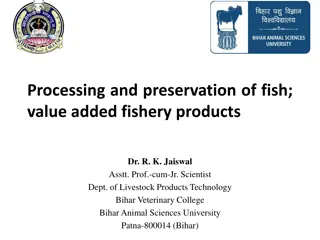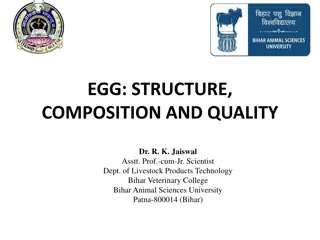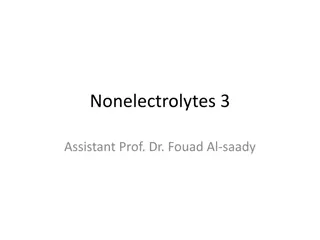Arguments on Non-Medical Egg Freezing: Ethical Perspectives by Professor Thomas S. Birk Petersen
Exploring the ethical dimensions of non-medical egg freezing, Professor Thomas S. Birk Petersen discusses reasons for and against this practice. He delves into implications for reproductive freedom, equality, and challenges the individualization argument. The analysis considers the potential social impact and ethical dilemmas surrounding the use of technology for fertility preservation.
Download Presentation

Please find below an Image/Link to download the presentation.
The content on the website is provided AS IS for your information and personal use only. It may not be sold, licensed, or shared on other websites without obtaining consent from the author.If you encounter any issues during the download, it is possible that the publisher has removed the file from their server.
You are allowed to download the files provided on this website for personal or commercial use, subject to the condition that they are used lawfully. All files are the property of their respective owners.
The content on the website is provided AS IS for your information and personal use only. It may not be sold, licensed, or shared on other websites without obtaining consent from the author.
E N D
Presentation Transcript
Arguments on thin ice: On non- medical egg freezing and individualisation arguments By Professor of Ethics, Thomas S birk Petersen Roskilde University, Denmark E-mail:thomassp@ruc.dk Lund University May 5, 2023
Who the H am I? Research areas My two main areas of interest: Bioethics: assisted reproduction, euthanasia, organdonation, neuroethics, sportsethics. Criminal Justice Ethics: criminalization theory, the ethics of situational crime prevention.
Medical and non-medical reasons for egg freezing Medical reasons: By cryopreserving the eggs of unhealthy women (e.g. women who undergo cancer treatment, that may damage their eggs), their chance of having offspring after the treatment can be boosted. Non-medical reasons/social freezing: By cryopreserving the eggs of healthy women for fertility preserving reasons, which are not directly related to medical issues or concerns.
Arguments in favor of freezing eggs for non-medical reasons Women and reproductive freedom: Full ownership of their own body and their gamets. Women and reproductive equality: Increased equality between men and women: Non-medical egg freezing can increase the opportunity (compared to men) to have children. Benefits to the potential child: Using younger eggs can reduce incidence of chromosome abnormalities.
A reconstruction of on argument from individualization P1: There is a moral reason against individuals using technology X in order to try to handle a problem that is social/structural in nature if the use of X will work against a social solution to a socialproblem P. P2: If individuals make use of a technology like NMEF, this will work against a social solution to P. C: There is a moral reason against individuals using NMEF.
3 interpretations of the argument: how can the individual use of NMEF work against a social solution to the social problems women face on, for example, the labour market? The non-address view: Worse, it [non-medical egg freezing] isn t a social solution, so it cannot address the social causes that make it so difficult to balance career and family. Morgan and Taylor (2013). The diversion of attention view: the attention given to egg freezing may be diverting employers [or others ] from making critical structural changes that would keep women in the pipeline. Mayson & Ekman (2017). The further oppression view: technological solutions to social problems [such as NMEF] often result in the further oppression of disadvantaged groups Harwood (2017).
Challenges to this versions of the individualization argument Concerning the non-address view: Access to and use of NMEF may benefit some women, when it comes to reproductive freedom and career opportunities. Therefore, the use of NMEF can address certain social causes of inequality between men and some women. Not addressing an issue X by doing Y, does not automatically make Y morally problematic. For example treating the indiividual symptoms of a cancer patient, does not seem wrong even though you thereby do not tackle some of the causes of cancer.
Challenges to this versions of the individualization argument Concerning the diversion of attention view: There is no evidence showing that womens use of NMEF divert attention from the search for social solutions to social problems. The are obserations pointing in the other direction: The debate on NMEF ussually attracts attention to problems that women often face in the labor market. Moreover, NMEF has existed alongside improvements for women on the labor market. Further, as a women you can both have NMEF and pay attention to social change. Further; Imagine a case where 1000 children a year are brought into the world thanks to NMEF, but that this will draw a little attention away from reducing the social causes of social inequality between men and women. Is this morally problematic?
Challenges to this versions of the individualization argument Concerning the further oppression view: Women with low-income may also benefit from NMEF if offered and paid by the welfare state of by companies. What if the solution to the social problem of an unfair labor market is not around the corner and is not caused by women using NMEF? Then it seems morally acceptable to let women use NMEF.
Two general points: We can challenge the idea (of those posing the argument) that women mainly use NMEF due to social problems on the labour market. In fact, a recent study shows that women who choose to use NMEF do it primarily because they want to have children and because they lack a suitable partner. Only 1% does it for job related reasons. We can do both improving reproductive autonomy by accepting social egg-freesing and improve the labor market in ways that give women more opportunities.
Conclusion The versions of the individualisation argument that have dealt with here, are not convincing and should not make us conclude that the use of NMEF is morally problematic. There are of course other arguments against the use of NMEF, that have not been dealt with, in this talk.























